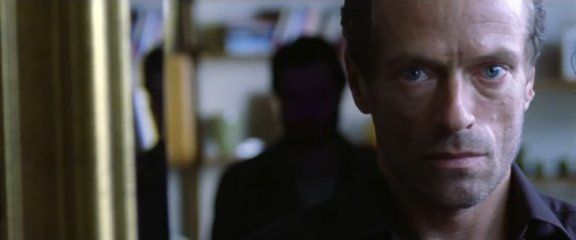Do you know my wife?

A man comes home from a business trip and finds his wife missing, with no sign of a break-in. (In fact, he's the one who has to break into their apartment since the chain is still on the latch.) Frantic, he questions his neighbors and calls the police, but nobody seems to know -- or is willing to say -- what could have become of her. There are plenty of suspicious characters about, though, some of whom have a predilection for leather apparel (jackets and gloves, in particular), which gibes with the black-and-white inserts of a woman -- the wife, we presume -- being caressed and cut up by a leathered-up question mark with a knife.
With a description like that, there can be no doubt that we are squarely in the neo-giallo territory of Amer writer/directors Hélène Cattet and Bruno Forzani. Indulging their twin fetishes for extreme closeups and narrative obscurantism, 2013's The Strange Colour of Your Body's Tears is mostly centered on frazzled businessman Dan Kristensen (Klaus Tange), but it also peels off periodically to dramatize the stories being told to him by the people he questions about his wife. For instance, there's the woman upstairs who insists on being shrouded in darkness and tells him of her own husband's disappearance while investigating the mysterious goings-on in the apartment above theirs (after going to extremely foolhardy lengths to do so). And the detective on the case tells him of a surveillance job gone awry that Dan interrupts, petulantly asking what it has to do with his missing wife. As well he might.
At the risk of overanalyzing the film -- something its elliptical nature all but invites -- The Strange Colour of Your Body's Tears is related to Amer in the sense that its central mystery, the absence of Dan's wife Edwige, appears to be directly linked to her discovery of her own sexual appetite. (Those faceless, leather-jacketed men don't come out of nowhere, you know.) In this way, it is Dan who may be the true victim, as evidenced by the circular nightmare he has where he is repeatedly awoken by his door buzzer and stumbles around his apartment completely naked, a welcome reversal of the position in which the women more often find themselves in this genre. Cattet and Forzani also get points for revealing the meaning of their title without having somebody come right out and explain it. In an age where seemingly everything needs to be spelled out, that kind of restraint is to be savored.